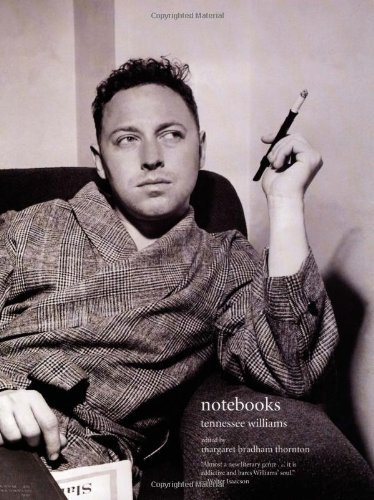
Tennessee Williams’s Notebooks, here published for the first time, presents by turns a passionate, whimsical, movingly lyrical, self-reflective, and completely uninhibited record of the life of this monumental American genius from 1936 to 1981, the year of his death. In these pages Williams (1911-1981) wrote out his most private thoughts as well as sketches of plays, poems, and accounts of his social, professional, and sexual encounters. The notebooks are the repository of Williams’s fears, obsessions, passions, and contradictions, and they form possibly the most spontaneous self-portrait by any writer in American history. Meticulously edited and annotated by Margaret Thornton, the notebooks follow Williams’ growth as a writer from his undergraduate days to the publication and production of his most famous plays, from his drug addiction and drunkenness to the heights of his literary accomplishments. At one point, Williams writes, “I feel dull and disinterested in the literary line. Dr. Heller bores me with all his erudite discussion of literature. Writing is just writing! Why all the fuss about it?” This remarkable record of the life of Tennessee Williams is about writing—how his writing came up like a pure, underground stream through the often unhappy chaos of his life to become a memorable and permanent contribution to world literature.
Author

Thomas Lanier Williams III, better known by the nickname Tennessee Williams, was a major American playwright of the twentieth century who received many of the top theatrical awards for his work. He moved to New Orleans in 1939 and changed his name to "Tennessee," the state of his father's birth. Raised in St. Louis, Missouri, after years of obscurity, at age 33 he became famous with the success of The Glass Menagerie (1944) in New York City. This play closely reflected his own unhappy family background. It was the first of a string of successes, including A Streetcar Named Desire (1947), Cat on a Hot Tin Roof (1955), Sweet Bird of Youth (1959), and The Night of the Iguana (1961). With his later work, he attempted a new style that did not appeal to audiences. His drama A Streetcar Named Desire is often numbered on short lists of the finest American plays of the 20th century, alongside Eugene O'Neill's Long Day's Journey into Night and Arthur Miller's Death of a Salesman. Much of Williams' most acclaimed work has been adapted for the cinema. He also wrote short stories, poetry, essays and a volume of memoirs. In 1979, four years before his death, Williams was inducted into the American Theater Hall of Fame. From Wikipedia